Contemporary liberalism, at least with respect to economic policy, seems to have a strong focus on gross income inequality. This seems to be considered very unjust and an obstacle to a more prosperous society.
I don't feel this way unless the government and private sector form a coalition to stamp out competition, but let's go with the idea that income inequality is highly undesirable. We want to narrow the gap between the rich and the poor. We're not merely happy to eliminate poverty and want to eliminate gross income inequality regardless.
My proposal is that trying to do this through government intervention and mandates is often an exercise in utter futility and will often hurt the poor workers below. It's a problem I have with Bernie Sanders. He often says things like, "Let's get down to basic morality," and often cites income inequality instead of discussing the realistic consequences of his proposals and whether they will actually help the poor.
Consider the stereotypical negative image of the greedy capitalist who exploits workers and then takes all the profits for himself. I know for certain that this does not accurately represent all capitalists, but let's just go with this very cynical stereotype. For simplicity, let's consider a basic two-tier system without bothering with shareholders: just a greedy capitalist with many workers below him.
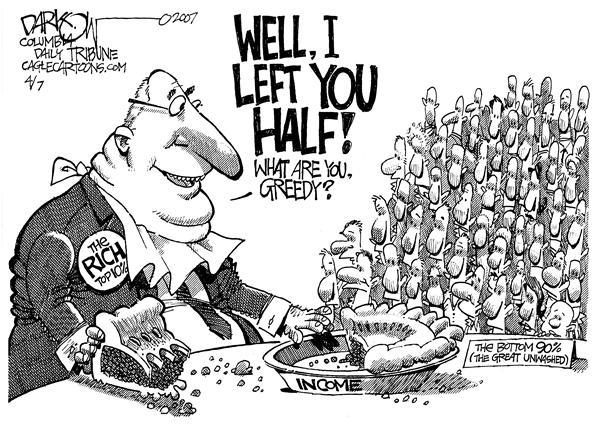
So let's consider the psychology of this type of greedy scumbag. His entire goal is to maximize profits. His incentives are entirely economical in nature so his behavior is quite predictable; he will always pursue actions that maximize profits. He keeps all profits for himself while paying his workers the lowest cost of labor he can get away with while charging customers the highest he can get away with. He stockpiles massive amounts of capital as a result.
For some reason, in spite of doing this, his firm continues to sell goods and his workers continue to work for him. Perhaps he holds a monopoly over his sector of the industry, leaving his customers with no alternative products and his workers with nowhere else to work.
Any compassionate person in this scenario should care about the plight of the workers below. So what can we do about it? Let's consider the options in terms of basic behavioral economics.
Minimum Wage
We can try to force the greedy capitalist to pay his workers more by raising minimum wage dramatically. Unfortunately this doesn't suddenly make the greedy capitalist into a charitable figure. His goal is still to maximize profits for himself. So what will a person with this type of psychology most likely do?
One thing he might do is lay off all employees except those with the highest skills and experience who can match the economic output to more than compensate for the higher wages. Those remaining workers might benefit but at the cost of all those who lost their jobs with the steep increase in job requirements.
Another thing he might do is seek to automate the labor with machines which cost less to maintain on an average hourly basis than the worker now receiving a higher minimum wage. Even the most skilled workers at the company who didn't get laid off might still soon find themselves out of a job.
Yet another thing he might do is raise the prices on goods and services, making the consumers pay for the higher labor cost. If many others do the same, then the cost of living rises with inflation. This leads to a scenario where those earning the now-higher minimum wage will find their money worth proportionally less, canceling out the benefits of higher wages. On top of that, this might combine with higher rates of unemployment which leaves those who lost their jobs doubly-screwed.
If none of these options are desirable or available, he might just outsource jobs or pack his bags and move his business abroad. Now everyone loses their job.

It's a lose-lose scenario. We don't end up getting the greedy capitalist to suddenly become charitable with a higher price floor on wages. He ends up transferring the costs and pain to everyone around him.
Benefits
Perhaps we can try to force our greedy capitalist to provide benefits to his workers, like mandatory health insurance. Unfortunately this works almost exactly like a minimum wage hike.
To our greedy capitalist, all that matters to him in this context is the cost of labor. With mandatory benefits, the cost of labor increases in ways similar to mandating a higher minimum wage.
The people who ultimately pay for those benefits will be those around him. He will seek all the types of options above to avoid paying the cost personally and transfer the costs to everyone else.
Further, if the mandatory benefits provide loopholes for, say, part-time workers, he will simply reduce many of his workers to part-time status. This is exactly how business owners published getting around the Employer Mandate. The typical strategy is to keep workers at around 27 hours/week to avoid the mandate when they work 30+ hours a week which would make them considered full-time employees.
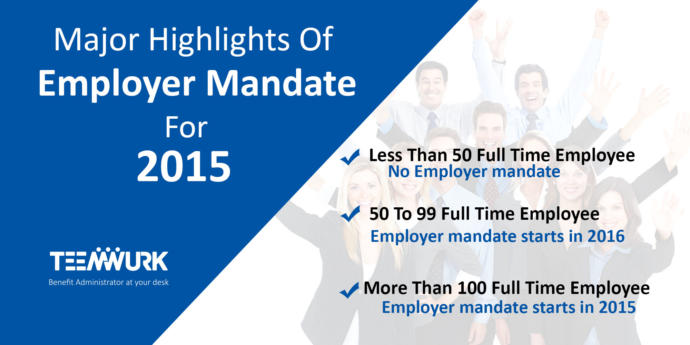
Now the workers are receiving even less than they could have made without the mandate since they're forced into part-time status. They don't end up receiving healthcare benefits, they just end up receiving fewer hours which leaves them in a worse position than ever before.
Taxes and Welfare
A more indirect approach which doesn't directly benefit the workers below is to try to extract heavy taxes out of our greedy capitalist and then redistribute that wealth to poor people in general, not just his workers. While this doesn't directly benefit the workers we care about, they might qualify as welfare recipients if we can extract a lot of tax revenue from the greedy capitalists out there.
Unfortunately our greedy capitalist still isn't interested in charity. If the taxes go up, he will likely find a way to either transfer the costs to other people like his workers or consumers or find ways to avoid the taxes outright.
With such a filthy rich person, he's going to have a lot of means at his disposal to avoid the taxes. He can lobby for exemption from a politician. He can hire skilled lawyers and accountants who can exhaust every single loophole to reduce the expenses. He can transfer funds in ways which are exempt from taxation.
Secondly, taxation transfers funds to potentially one of the greediest and most corrupt capitalists out there: the government. The recipients won't necessarily get much of that in return.

Even if our greedy capitalist cannot find a way to avoid coughing up the dough, he might then impose the additional tax burdens on his workers by reducing their wages or laying off more people who fail to match the highest standards of productivity. He'll again have further incentives to mechanize workers to squeeze every last drop of profit. He might charge more to the consumers to get them to basically pay for the taxes.
The greedy capitalist never personally pays taxes in a sense, even if he does. Since his workers are the ones generating the economic output and the consumers are providing the revenue, whatever chunk he pays, even if he pays, is coming out of the revenue and he's going to find ways to offset and compensate for that cost while maintaining maximum profits. Taxing him heavily is like demanding a slave owner to contribute a kidney. We might get a kidney from him if we're lucky to transfer to some poor soul, but it's not going to be his own.
If none of these options are available to avoid cutting heavily into personal profits, he might just outsource jobs or move his business to somewhere else in the world at the expense of all of the former workers at the bottom.

With greedy capitalists like this, higher taxes actually provide further incentives not to pay for them. This leads to the concept of the Laffer Curve.
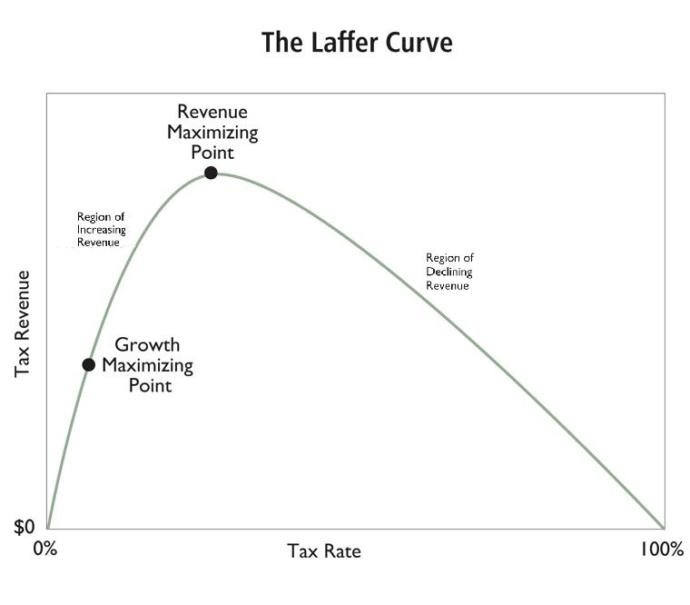
While it's not a very precise theory, it suggests that as tax rates get higher, there comes a cut-off point where tax revenue declines. The reason for it is simple: as tax rates get higher, the incentives to avoid paying taxes increases. After all, if the tax rate is 100%, there would be no incentive for anyone to work unless they can avoid paying the taxes and therefore tax revenues would be $0.
The exact cut-off point when revenues start to decline is not a hard science. Some economists believe it's at ~30%. Others believe it can go as high as ~70%. It may depend on the culture and the attitudes of the people paying the taxes.
With our greedy capitalist, chances are that he will seek every loophole to avoid paying the tax when we reach the lower end of the spectrum. After all, he only thinks in terms of dollar figures. If the cost of seeking loopholes is cheaper than the cost of paying the taxes directly, he will naturally seek the loopholes.

Competition
So how can we actually get our greedy capitalist to effectively share more of his income? The most effective way as I see it is to offer him stiff competition. We needed a Steve Jobs to compete against Bill Gates along with Linus Torvalds to keep them both in check. The situation would be much worse if we only had one of these figures.
With competition, the goods and services not only become competitively-priced, but the companies also have to compete for workers by offering them competitive wages. The workers then find themselves with maximum opportunities to find better, higher-paying jobs, and we end up with an equilibrium where the workers get paid more than the minimum without any charitable intentions on the part of their employers.

We don't have to rely on the wishful thinking of our greedy capitalist becoming charitable by offering him stiff competition. He will be compelled by competitive market forces to treat his workers better and offer a larger share of revenue or else he'll find his workers leaving him for another, more generous competitor who threatens his business. While this doesn't eliminate the temptation for automation, it can distract from the desire and also offer a competitive incentive for human laborers if they provide a quality service to customers which machines can't match.
When capitalists compete for customers and workers, the customers and workers win. When there's no competition, they both lose.
To encourage competition, I believe we have to do the opposite of the things proposed above. Reduce the regulatory burdens and reduce the tax burdens. With that, instead of jobs being exported overseas, we'll likely see the opposite happening.
With low regulatory/tax burdens, the country will begin to attract foreign investors and entrepreneurs like a magnet. Instead of having jobs "stolen" from abroad, the country can "steal" jobs from other nations. As a bonus, the lower burdens will make it easier for some of the workers to go into business for themselves, saturating the market with even more competition.
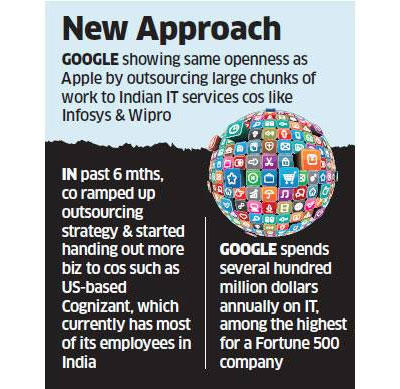
This is the only really effective way as I see it to make our greedy capitalist cough up the dough without changing his values. It's because a greedy capitalist is driven predominantly by economic incentives. With competition, he finally has economic incentives to pay his workers more or risk losing all of them to a worthy adversary.
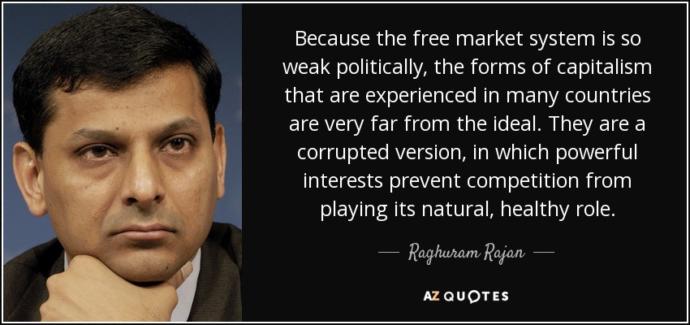
Values
Last but not least is to encourage a change in cultural values. This might require a bit of heavy-handed social conditioning towards a homogeneous society where people largely share the same values. Muhammad Yunus encourages such an approach. He is an unusual advocate of the free market, encouraging a form of humane capitalism.
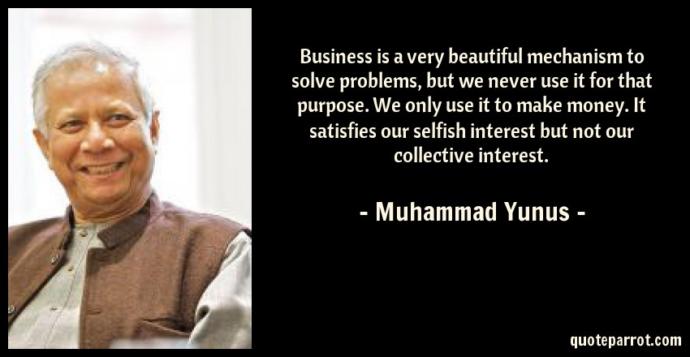
This is still based on a free economy with voluntary transactions, but a highly cooperative one where people voluntarily seek to help each other without the force of the government.
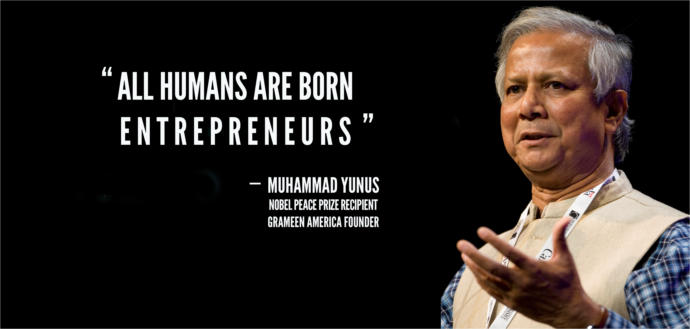

His vision of humane capitalism requires a fairly homogeneous society and a strong focus towards encouraging entrepreneurs of all sorts.

I find his ideas interesting since it's still based on a free society with voluntary exchange. We're not trying to force people to be charitable and noble which tends to backfire. Instead we educate and encourage them towards such actions, shaping a society where everyone seeks to create a better world. That could be another way to mitigate this problem effectively, although considerably more ambitious.
Achieving such cultural homogeneity might also allow a bit more socialism with government intervention. Such is the case with countries like Sweden as far as I can tell. Their cultural homogeneity frees them to a large degree from government corruption and also leads to many people who are happy to pay high taxes in exchange for public services.
This type of humane capitalism still requires reducing regulatory and tax burdens, since encouraging people of all sorts, especially the poor, to be job creators instead of job seekers will be futile if the startup costs for a business in that sector are enormous, require obtaining costly licenses, and seeking costly legal advice on HR laws and so forth.
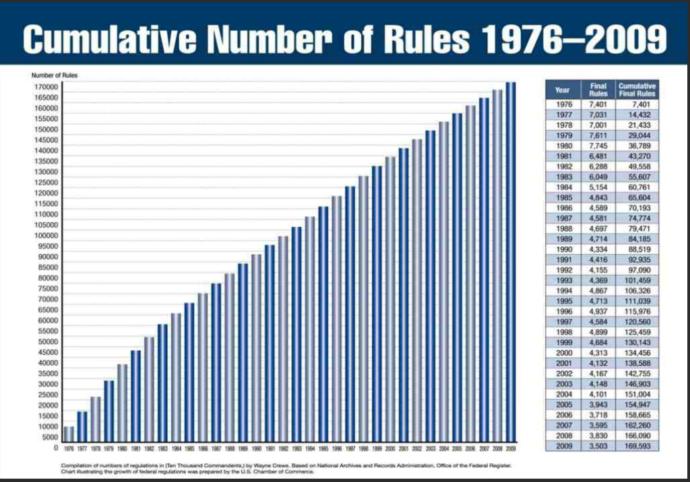
Conclusion
Anyway, I really believe these are the only effective ways to really reduce income inequality. The wealth will always flow in larger sums in an upward direction in pretty much any type of market, but reducing tax and especially regulatory burdens could at least saturate the market with competitive forces again to keep everything in check.
Mostly it's not the presence of the filthy rich that bothers me personally. It's the lack of availability for the poor to move up the economic ladder. This keeps people not only trapped in poverty, but keeps their children trapped in poverty as well as their childrens' children and so on.
It should be evident that repeated attempts to help the poor work their way up the economic ladder have largely failed in the United States. Wages for those at the bottom have been stagnant, and curiously more so after efforts to declare war on poverty. Meanwhile, very economically free countries that haven't bothered to fight massive wars against poverty have generally fared better when it comes to income mobility, especially for those at the bottom.
Still, for those who are bothered by the presence of the filthy rich, I hope I made a decent case that it's generally futile to try to get them to share forcefully. We could try to trap them into sharing by imposing law after law after law and gradually push them into a corner, but unless we can keep them and their business within the country, they'll likely just leave at that point.
For those who think supply-side economics is voodoo economics, there's plenty of evidence to show that this actually works. It won't "trickle down" wealth, but do it thoroughly and it'll almost certainly bring in many job opportunities.
Here is an example of one such case where supply-side economics worked marvelously in providing income mobility to those who were desperately poor. Aside from low regulatory burdens, Estonia achieved what was ranked to be the top-rated competitive tax system in the entire world. It should be no surprise that it invited foreign investors like a magnet.
Another excellent example of a deregulated free market is Steam. This is one of the few places where a single person with some skill and ambition can publish a product and become incredibly successful without starting off rich.

With that, we see the video game market being saturated with competition and not just from the richest people who had enormous startup capital. The underdogs are also able to compete against the biggest dogs. There are small indie developers who have managed to achieve as much success as some of the biggest game companies out there.
Such should be the case everywhere. With that, we should no longer see a market which is so rigged in favor of predominantly the rich just getting richer while everyone else is stuck in their place.
I'd be curious if people have any other ideas to tackle this problem. As far as I see it, to raise people out of poverty not only for themselves but for their children, we can't just provide welfare. They either have to secure a decent-paying job with employers competing for their labor or they need a decent chance of going into business for themselves affordably and easily. A market with high regulatory/tax burdens doesn't help this cause and very arguably hinders it.
 Holidays
Holidays  Girl's Behavior
Girl's Behavior  Guy's Behavior
Guy's Behavior  Flirting
Flirting  Dating
Dating  Relationships
Relationships  Fashion & Beauty
Fashion & Beauty  Health & Fitness
Health & Fitness  Marriage & Weddings
Marriage & Weddings  Shopping & Gifts
Shopping & Gifts  Technology & Internet
Technology & Internet  Break Up & Divorce
Break Up & Divorce  Education & Career
Education & Career  Entertainment & Arts
Entertainment & Arts  Family & Friends
Family & Friends  Food & Beverage
Food & Beverage  Hobbies & Leisure
Hobbies & Leisure  Other
Other  Religion & Spirituality
Religion & Spirituality  Society & Politics
Society & Politics  Sports
Sports  Travel
Travel  Trending & News
Trending & News
Most Helpful Opinions